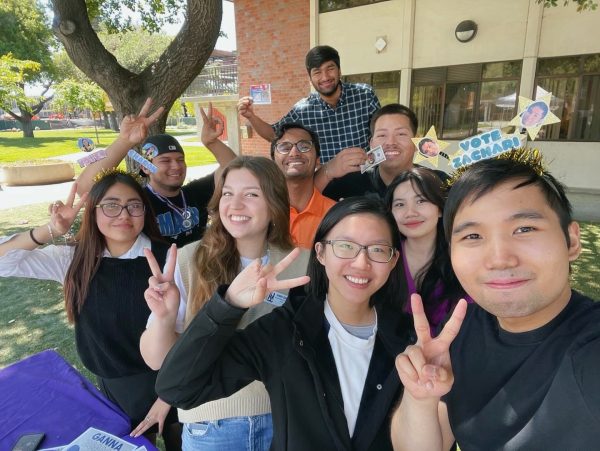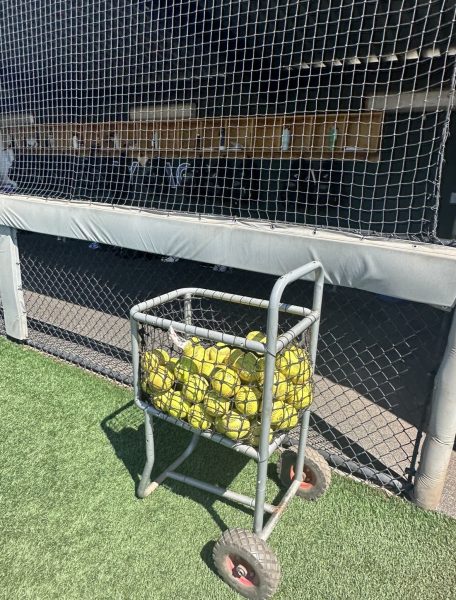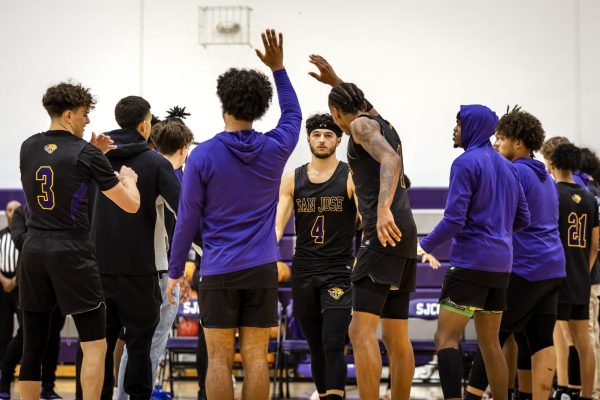A look into the mental health of SJCC student athletes
The hardships of prioritizing school, sports and more
Photo Courtesy of San Jose City College Athletics Instagram
The SJCC Women’s Softball team pose after a historic win for their coach in April 2022.
In a May 2022 National Collegiate Athletic Association (NCAA) survey, college athletes reported elevated levels of exhaustion, anxiety, and depression.
Academic concerns, financial worries and planning for the future were the most frequently reported stressors. These concerns were highest among more marginalized and vulnerable groups, namely women, people of color, and those among the LGBTQIA+ community.
Student-athletes are continually faced with juggling athletic activities , schoolwork and home life. This is all in addition to managing their own self-care – both the mental and physical kinds – as the semester progresses.
It takes quite the toll.
The Athletes
In order to be eligible for intercollegiate competition, a student-athlete must be continuously and actively enrolled and attend class in a minimum of 12 units during the season of sport.
“I always felt like I didn’t have time,” said Malaya Street, a former SJCC softball player. Street said that she had a very hectic and cramped schedule, one that frequently included early mornings and late nights. Street noted that she always had to leave her practices early to go to class, which left her with a sense of unpreparedness come game-time.
“It depends on how many credits,” Female Basketball Player Meggie Awala said. Awala, along with other athletes, take on a multitude (20 or more) of credits each semester following strict academic and sport schedules.
There are 86 men and 37 women who take part in at least one sport at San Jose City College.
Healthy Body, Mind and Soul
“It feels like my life is on hold right now”, Street said.
Street, going into her last season in 2022, had to endure many challenges. She had a devastating ACL tear, lost both her grandparents within the span of a month apart, and missed a job opportunity she had lined up.
“I try to break up the classes,” Athletics Counselor Veronica Harris said.
In general, what Harris does is go over all the classes they’re going to need for general education or for their degree, and then break up the classes so that they’re not taking all the hard classes at once, especially during the season.
“When they are in season, I try just to take one hard course during that semester, but it also depends on what their major is,” Harris said
The public view of athletes is often dominated by larger-than-life figures, such as those of Michael Jordan or the late Kobe Bryant. As competitors, they are considered modern-day warriors, battling adversity with courage without much regard for their well being.
“We are not robots. We don’t just play the sports. Were people playing the sport and having things that happen to us that we feel,” Briana Scurry said on a twitter post Jul 27, 2022.
Athletes always hope for an injury-free career, but getting hurt is often an unavoidable part of playing in a sport. Small injuries tend to be managed with little to no disruption to an athlete’s participation in physical activity and daily living, but more major injuries can trigger or unmask latent mental health issues such as depression, anxiety, disordered eating, and substance abuse.
“I felt like I was at the lowest and I am still trying to climb my way out of that”, Street said of her life after encountering such intense struggles.
While Street feels she hasn’t fully seen the light at the end of the tunnel, she said she does thank and appreciate the close bonds she has made with her coaches and teammates, expressing that she remains hopeful going forward.
Two hours of practice coming after seven hours in school can be a major source of burnout, so athletes need outlets to get their energy back and prioritize their psychological health and wellness.
Building a support system, setting attainable goals, and identifying coping mechanisms are all ways athletes can better their mental health. SJCC student athletes like Street and Awala said they also have access to a variety of advisors and experts to get more in-depth help on a professional level.
“Mental health comes first to me. If I’m not doing well, then I take time off for myself,” Awala said.
When not on the court, she said she listens to a variety of music, writes in a journal, and seeks out friends to safely talk out her emotions with.
Do The Coaches Care?
Being a student-athlete is no easy feat, but genuine relationships between athletes and coaches can help to make the workload more manageable.
Head Softball Coach Debbie Rooney is an example of that, as she said she makes efforts to take care of her players year after year, both on-and-off the field.
“Instead of looking at all the negativity, try to look at what’s positive,” Huntze-Rooney said.
Huntze-Rooney has been coaching softball for SJCC for 32 years and said she tries to create a safe and family oriented space for her players.
Huntze-Rooney offers yoga days where there normally would be practice.
“Mental health is so evident,” Huntze-Rooney said.
Your donation will support the student journalists of San Jose City College. Your contribution will allow us to purchase equipment and cover our annual website hosting costs.












